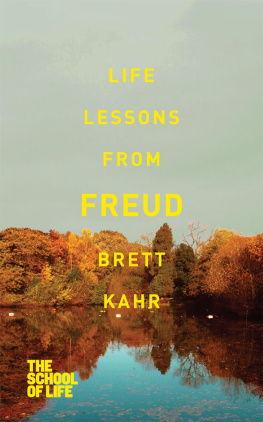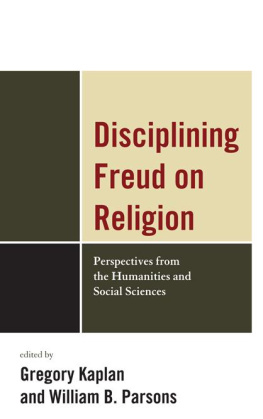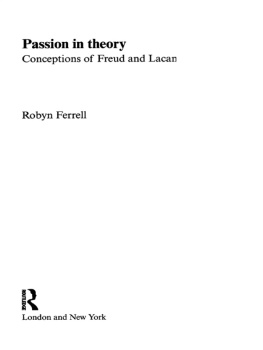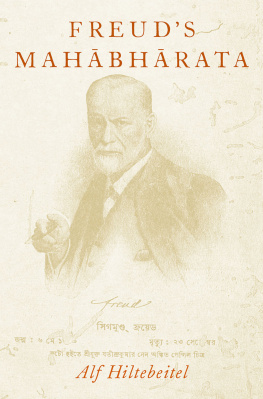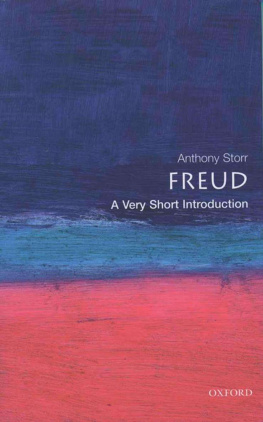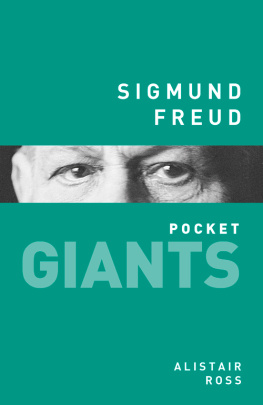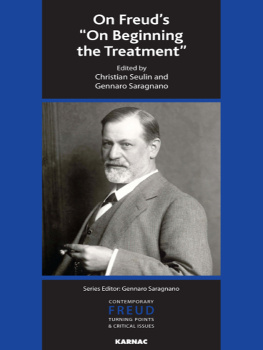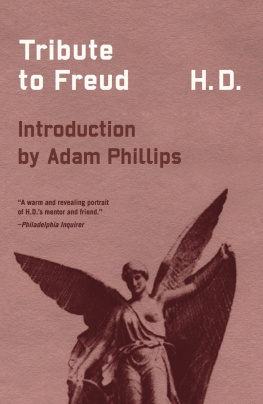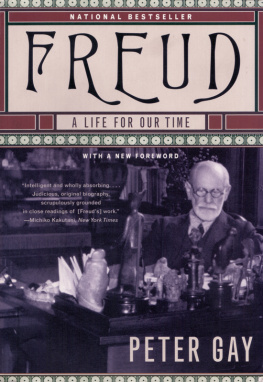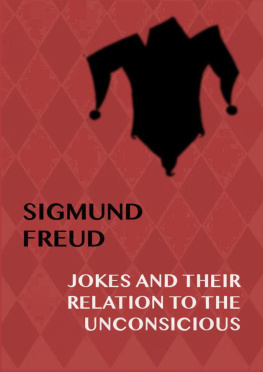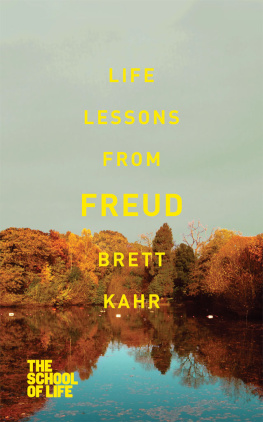
For Luca and Rafe,
in the hope that they may find these lessons of use one day
INTRODUCTION

Only days after arriving at university as a fresh-faced student, I found myself in the Senior Common Room, clutching a glass of Jerez sherry, at a Freshers Week drinks party with the faculty. After chatting first with a medieval historian, and then with a professor of ancient Greek, I became ensconced in conversation with an eminent biochemist. Freud, he bellowed, youre interested in Freud? Yes, I mumbled, clearly betraying all the naivety and ignorance of a fledgling, trainee psychologist. Hunh, he smirked contemptuously, spilling drops of his third or fourth glass of sherry as he pontificated. Fifty per cent of everything that Freud wrote is completely wrong... and the other fifty per cent is just plain common sense. Feebly, I attempted to argue my case that Freud might, perhaps, have some merit, but to no avail. This distinguished gentleman had resolutely made up his mind. Freud did not qualify as a proper scientist. Disconsolate, I left the party, worried that my youthful admiration for Freud might be dangerously misguided.
Any jibes that I had to navigate in the 1980s rather pale by comparison with what Sigmund Freud had to endure during the first decades of the twentieth century. A neurologist by training, Freud specialized in the treatment of nervous diseases such as hysteria and anxiety neurosis; and as a young doctor, he shocked the Viennese medical establishment with his observations that many psychologically unwell people might have suffered from traumatic experiences in infancy and childhood, often of a sexual nature. Freud wrote about these traumas in graphic detail, avoiding the euphemisms regularly deployed in late-nineteenth-century discourse. This remarkable frankness caused many senior physicians to lambaste Freud as little more than a sexually perverse lunatic.
When Freud died in 1939, Mr Andrew Rugg-Gunn, a Senior Surgeon at the Western Ophthalmic Hospital in London, attacked the dead psychoanalyst in the pages of the venerable medical journal The Lancet, exclaiming that Freuds unhealthy obsession with sex has been responsible to an overwhelming extent for the depravity of mind and perversity of taste that has affected, among others, English people and particularly English women since the last war. In itself a sufficiently grave evil, this result has had consequences immeasurably malignant, for it undoubtedly paved the way for wide acceptance of that complete Jewish ideology out of which sprang bolshevism, nazism and the present war. But The Lancet also published an encomium written by Dr John Rickman, one of Freuds earliest British disciples, who claimed that Freud made one feel to be in the company of a new kind of being an ideal for human nature. Clearly, Freud has evoked a great range of responses, from those who have come to regard him as the most important psychologist in history, to those who have ridiculed him as an obsessive, lascivious charlatan.
Born on 6 May 1856, in Freiberg, Moravia, part of the sprawling Austro-Hungarian empire, Sigismund Schlomo Freud grew up in a relatively impecunious home, the son of a struggling wool merchant and his wife. In 1859, the family moved to Vienna, where the young Freud distinguished himself academically. Shortly before he graduated from school, Freud changed his name from the Hebraic Sigismund Schlomo to the more Germanic Sigmund, both as an expression of his wish to avoid, as much as he could, the regnant anti-Semitism of the period, and to pronounce, with Wagnerian bravado, his knightly intentions. Sigmund Freud would not be a struggling merchant like his father. He would attend the Universitt zu Wien (University of Vienna), the ancient seat of learning founded in 1365, and would become a physician.
Freud qualified successfully as a medical doctor in 1881, and shortly thereafter, he joined staff of the Allgemeines Krankenhaus, Viennas premier hospital. Also at this time, he made the acquaintance of a prominent, more senior physician, Dr Josef Breuer, who told Freud about his extraordinary treatment of a young Viennese lady, Bertha Pappenheim, who suffered from a host of puzzling hysterical symptoms such as visual hallucinations and unexplained paralyses. Whereas other doctors of the period would prescribe sedatives, or rest cures, or hot baths, or, indeed, no treatment at all, for their hysterical patients, Breuer began to have conversations with Frulein Pappenheim. Surprisingly, simply by talking, her symptoms began to disappear, prompting the young woman to refer to this process as chimney sweeping, or as the talking cure. Dr Breuers account of this work impressed Freud hugely and taught him a great deal about the treatability of the neuroses, those psychological disorders which seemed to have no obvious physical cause, and which did not respond wholly to conventional somatic treatments.
Most nineteenth-century physicians regarded hysterical neurotics as silly, hyperemotional society women. Today, we might refer to them, somewhat unkindly, as drama queens. But Freud began to look beyond their attention-seeking behaviours, suspecting that these women suffered from deeper concerns. In order to improve his knowledge of hysteria and the other psychoneuroses, he spent several months in Paris at the Salptrire hospital, working with Frances leading neurologist and hysteria specialist, Professeur Jean-Martin Charcot, who taught Freud that men, too, could suffer from hysteria, and, even more importantly, that the symptoms of hysteria could be cured through hypnosis. Vitally, the young Sigmund Freud had now come to appreciate that neurosis need not be a permanent, crippling condition; the illness could, in fact, be ameliorated, albeit not by medical means, but, rather, by psychological methods.
Upon his return to Vienna, Freud opened his own private practice on Easter Sunday 1886, deploying the newfangled talking cure that he had learned from Breuer, and the hypnotic procedures that he had absorbed from Charcot and others (eventually abandoning the latter technique, and concentrating on the development of the former). One of his patients, a woman called Madame Benvenisti, must have found her treatment with Freud helpful, and in thanks, she gave him a couch as a present. Freud soon began to encourage his patients to lie on this comfortable divan, and he then seated himself behind the couch out of sight which allowed his patients to speak about their private fears and fantasies, their memories and desires, their sexual and aggressive impulses, and their dreams and symptoms, in a less inhibited manner. To his astonishment and delight, the talking cure proved exceptionally powerful, and Freud began to achieve impressive results. His patients began to articulate their traumas, and as a consequence, they experienced freedom and relief for the first time. While most of the Viennese danced to the light-hearted waltzes of Johann Strauss the Younger, which helped them to forget their troubles, Freud forced the Viennese to remember, and he created a unique setting in which they could do so.
It would be anti-historical to suppose that Freud burst onto the psychiatric scene as Athena from the skull of Zeus. Other physicians in Vienna, and on the Continent, had also begun to undertake work of a similar nature; indeed, much of fin-de-sicle Vienna brimmed with the excitement of new ideas not only in medicine, but also in politics and in the arts; and by the turn of the twentieth century, the Austrian capital had become a breeding ground for revolutionary ideas, whether in the drawings of Egon Schiele, who defied convention with his sketches of bare, corpse-like figures; whether in the music of Arnold Schnberg, who introduced atonality; or whether in the plays of Arthur Schnitzler, who wrote about sexuality with great explicitness. Freud formed only a part of this swirling climate of creativity, of liberalism and of provocation, albeit quite an important part.
Next page
